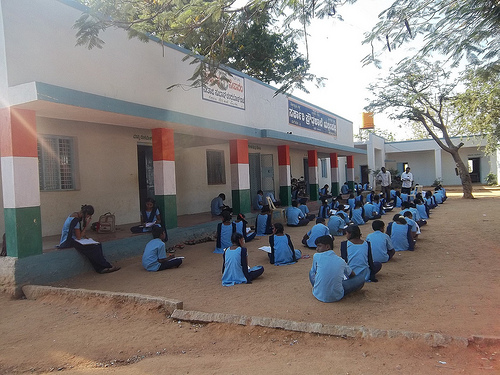India has had ‘Free and Compulsory’ education on its statute books for several years now. In fact, Article 21A of the Constitution of India places an obligation on the Government to provide ‘Free and compulsory education to all children from the age of 6 to 14 years’. In the midst of corruption scandals, even the UPA managed to enact the Right the Education Act, imposing the duty on the Government to create schools throughout the country.
But like the proverbial slip ‘twixt the cup and the lip, we often find that the noble intent of the law is defeated by the weakness of the people on the ground. Such is the case with the drive to provide rural Indian children with a primary education.
A survey conducted in 2013 (the ASER, or Annual Status of Education Report) showed that a majority of fifth-standard students were not able to read from a second-standard textbook and neither were they able to complete simple mathematical problems. Indeed, even though enrollment is on the rise – more rural children go to schools today than ever before – the question of the usefulness of such an education is an important one.

Image courtesy : Flickr
What are the major problems with the system of rural education that has led to this situation?
1. Accessibility
Despite efforts, the sheer scale of India means that many villages do not have a primary school, let alone a secondary one. The moment ‘attending school’ involves travelling several kilometres to a neighbouring village, the probability of a child actually attending, or at least attending regularly, drops. The situation often gets worse as a child grows. A 2011 UNESCO report showed that more than 16 million adolescents were not enrolled in any school in India.
2. Teacher availability
Those of us who had the privilege to attend proper schools – and especially the elite ones – would know that it is not the four walls of a classroom that make a school. It is the teachers who impart knowledge to the children. But when it comes to Government schools in rural India, the situation can be bleak. Often there is only one teacher to teach all the classes, sometimes there are too many students, at other time too few, and whether due to inadequate pay or just a lack of motivation, teacher attendance can be as low as student attendance. We often hear the stories of schools where the teacher only shows up once a month to collect his or her salary, and while this is the exception, the quality of teaching provided is far short of even the minimum expectations.
3. Parental illiteracy compounds the problem
In cities, where the school-going population is generally at least the second generation in a family to be literate, if the quality of education is not upto the mark, parents protest, complain and often remove their children to a private school. In villages, it is often a sad truth that the parents are unaware of the real expectations they should have from their children’s education. Even if they did, the limitation mentioned in the second point above – school availability – becomes a problem.
4. Government apathy
In the midst of all this, we have a situation where successive Governments have sought to cut, rather than increase, the funding for primary and rural education. Despite the crying need for investment in the sector, the focus, both of the ministry and the media, has been on the few elite institutions like IIT’s and IIM’s rather than on improving the quality of the schools that create such students. The extremity of governmental apathy was revealed in the budget presented by the current government in 2016, which gave education an abysmally low allocation of Central government funds.
The sad reality is that the lofty ideals of both the Constitution and the posturing of the Right to Education Act are likely to remain worth no more than the paper they were written on. Governments will continue to find other things to spend their money on – advertisements, weapons and foreign trips – and gladly leave the children of rural India languishing in the darkness of what passes for an education.


























